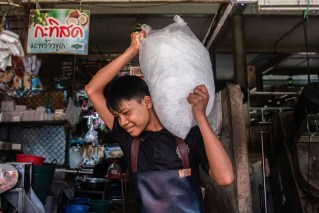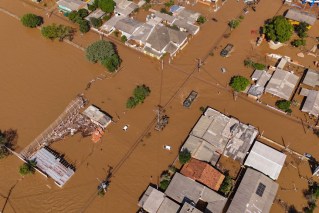The glitz and kitsch of Eurovision grand final in pandemic, minus one hot favourite

'Stefania' of Greece performs at the Eurovision grand final in Rotterdam. Photo: Getty
After more than a week of rehearsals, two semifinals and 53,000 COVID-19 tests for fans, staff and performers, the Eurovision Song Contest that was cancelled last year because of the pandemic has gone live in front of 3,500 fans and a global television audience.
Ahead of the show, crowds gathered outside the Ahoy arena in the Dutch city of Rotterdam. Drag queens mingled with families as a man in a gold suit waited to get into the venue.
The hugely popular music festival that oozes flamboyance is seen as a significant step toward a post-pandemic return to live entertainment, but not everybody managed to avoid the virus.

A video link-up with Iceland’s Dadi og Gagnamagnid band during the dress rehearsal. Photo: Getty
The popular Icelandic band Dadi og Gagnamagnid, known for its kitsch dance moves and green leisurewear costumes, is in the final, but can’t perform live because one member tested positive for the virus earlier in the week.
Instead, viewers will see a recording of one of the band’s dress rehearsals.
“The point was to go and actually experience how it was to compete in Eurovision, and that’s just really not happening,” lead singer Dadi Freyr said from isolation in Rotterdam.
While the entertainment world has changed in the pandemic, the Eurovision final formula familiar to its worldwide legion of fans has not. The event is being hosted as usual by the last winner, the Netherlands, except that it won in 2019.
After acts from 26 countries perform their songs Saturday night (local time), they are awarded points by panels of music industry experts and by members of the public voting by phone, text message or via the contest’s app.
The winner takes home a glass microphone trophy and a potential career boost.

Maneskin, from Italy, performs the song Zitti E Buoni. Photo: Getty
The two favourites among bookmakers couldn’t be more different. One is Maneskin, an Italian band whose blend of funk and rock channels the Red Hot Chili Peppers. The other is Barbara Pravi, a French singer whose style harks back to Edith Piaf.
Milo Mateo and Carlo Sossa, wearing matching sequin-covered hats and draped in Italian flags, came from Italy for the show and were hoping for a Maneskin victory since that would bring next year’s contest to Italy.
“If we win, it will be very, very nice, because the next year will be in Italy. That’s very good. Let’s hope. Fingers crossed,” Mateo said as he waited to get into the arena.
Pravi’s song Voila is a restrained ballad, but there is still plenty of the over-the-top spectacle that has become Eurovision’s trademark.

Barbara Pravi, of France, performs a song reminiscent of Edith Piaf. Photo: Getty
Norwegian singer Andreas Haukeland, whose stage name TIX is a reference to growing up with Tourette syndrome, sings his song Fallen Angel in a pair of giant white wings while chained to four prancing devils.
Cyprus’ Elena Tsagrinou is flanked by four dancers in skintight red costumes as she performs El Diablo, a song that ignited protests among Orthodox Christians in the Mediterranean island nation who claim it glorifies satanic worship. Tsagrinou says it’s about an abusive relationship.
San Marino has enlisted the help of US rapper Flo Rida to join performer Senhit in her bid to win the title for the first time for the tiny city-state surrounded by Italy.

Norway’s TIX in a pair of giant white wings while chained to four prancing devils. Photo: Getty
-AAP








